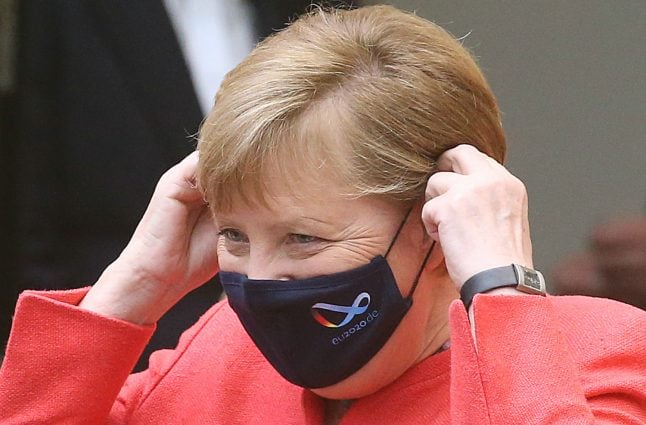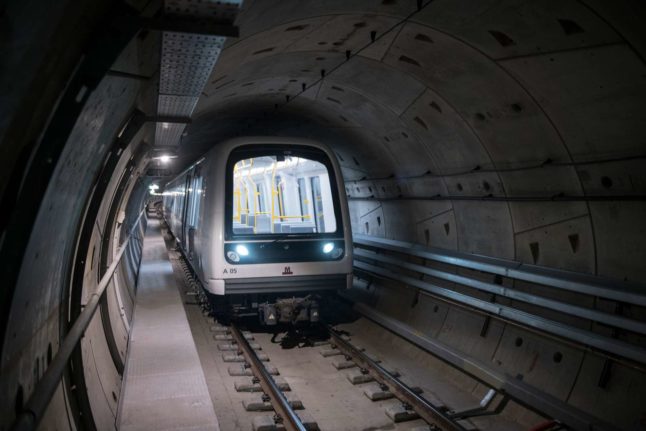In April face masks became mandatory across German states in shops and on public transport in a bid to slow the spread of Covid-19.
However, now a row over whether they should remain compulsory is breaking out across the Bundesrepublik.
It comes after politician Harry Glawe in the northeastern state of Mecklenburg-Western Pomerania, spoke out in favour of getting rid of the mask requirement, or Maskenpflicht as it is known in German, to help the pandemic-hit retail trade.
“If the infection rate stays so low I can't see any reason to maintain the duty to wear masks in shops,” said the state's economy minister, who is a member of Angela Merkel’s Christian Democrats (CDU).
“I can fully understand why the retail sector is so impatient for us to end compulsory mask wearing,” he told Welt am Sonntag.
Glawe told the newspaper he expects the state to announce an end to mask wearing in shops during a meeting of the state government on August 4th. He added though that social distancing rules – 1.5 metre distance is required between people not from your household in Germany – will likely be kept in place.
READ ALSO: 'Get rid of deodorant': How Berlin's BVG wants to encourage face masks
'Coronavirus is still there'
Germany's Health Minister Jens Spahn said he was opposed to the idea of getting rid of the requirement to wear masks.
Spahn wrote on Twitter that he understood “impatience and the desire for normality”. But the coronavirus is “still there”.
Where distance can not always be ensured in closed rooms, the mask is “necessary”, wrote Spahn. However, amending coronavirus regulations is up to individual states rather than a federal decision.
Ich verstehe die Ungeduld und den Wunsch nach Normalität. Aber das Virus ist noch da. Wo in geschlossenen Räumen der nötige Abstand nicht immer gesichert ist, bleibt die Alltagsmaske geboten. So achten wir aufeinander und schützen uns gegenseitig. #COVID19
— Jens Spahn (@jensspahn) July 5, 2020
Spahn reaffirmed his views on Monday on Deutschlandfunk Radio. He said he believes wearing a mask is “still important” in order “to protect yourself and others”.
The state premier of Mecklenburg-Western Pomerania, Manuela Schwesig, also indirectly opposed the proposal of her economics minister, wrote Spiegel on Monday.
Just last week the state government had decided to extend the obligation to wear masks on public transport and in shops, Schwesig wrote on Twitter. The mask “is not popular, but it works”, she said.
We also asked Local readers what they think about mandatory face masks. Have your say on our poll on Twitter:
Germany is debating masks again. Do you think face coverings should remain mandatory on public transport and in shops in Germany?
— Rachel Loxton (@RachLoxton) July 6, 2020
Or Facebook:
Glawe said he planned to start talks with his colleagues in Bremen, Hamburg, Lower Saxony and Schleswig-Holstein.
“We are trying to get a uniform regulation for all northern German states,” the CDU politician said. “I would even prefer a nationwide end to the obligation to wear masks in shops.”
READ ALSO: North-east Germany considers ending mask wearing in August
Across Europe there's been a mixed reaction to face coverings in the pandemic. Switzerland was reluctant for months to make masks compulsory but has now introduced a requirement. Germany, Italy, France and Austria have had the 'mask obligation' since late April.
Scotland is also set to introduce mandatory face coverings in certain public spaces from July 10th.
READ ALSO: 'You'd see me in a mask at the supermarket': Merkel insists she follows coronavirus rules
States split on the mask obligation
Several German states, including Schleswig-Holstein and Hamburg, however, have rejected this step at the moment.
And Rhineland-Palatinate said that particularly during the holiday season it was important to keep the number of infections down.
A spokeswoman for the state health ministry told the Rheinische Post newspaper that lifting the obligation to wear masks would send the wrong signal at this stage.
Lower Saxony's economy minister Bernd Althusmann, on the other hand, spoke out on Sunday in favour of changing the “strict mask obligation in the retail trade into a recommendation in the coming months” if the number of infections remains low.
Althusmann wants to discuss “whether we should turn compulsory mask wearing into a recommendation” after the summer holiday end in August.
The retail trade in Lower Saxony is suffering massively, he stressed. However, this view did not meet with approval in the Lower Saxony state chancellery.
“The state premier is still of the opinion that we must be very careful in dealing with coronavirus,” the chancellery said.
Masks are 'reasonable demand'
Social Democrats (SPD) leader Norbert Walter-Borjans has also taken a clear stance against getting rid of compulsory masks and, according to him, Chancellor Merkel agrees.
“I spoke with the Chancellor about this today, and we agree that wearing masks in shops is a demand, but a reasonable demand,” Walter-Borjans said during a live broadcast on Sunday by Bild newspaper.
The SPD leader spoke out in favour of continuing to exercise caution during the pandemic. “In the store I will put on a mask. And if everyone does, we will have contained a large number of possible infections,” said Walter-Borjans.



 Please whitelist us to continue reading.
Please whitelist us to continue reading.
I have absolutely no problems with wearing a face mask or seeing them on other people. I don’t feel any of my independence or personal rights are challenged by a small folded piece of fabric and some elastic. It will take a lot more than that to phase me. I don’t know what all the fuss is about…It’s only a small piece of fabric and if it helps me, or perhaps only one other person on this planet, to stay healthy then the purpose and intention was worth it.
Whilst I hate the stifling anonymity of masks, and just love that facial interaction is a vital part of human society, I agree with ‘Fred’ that it’s a small price to pay to prevent a second wave of infections. For heavens sake, Germany’s restrictions havn’t exactly been onerous compared to some countries. No-one has been compulsorily confined to their homes . . . where I live in Baden-Wurtemberg it’s always been possible to go to the supermarket, to the DIY store or to go out to exercise. Let’s finish the job and wear our masks until the experts tell us otherwise.
If we are more conservative in public then our schools can go back full-time in August. If distancing has to be kept in place for schools then parents will have to have their children at home. Lets relax those things that make a real difference to peoples lives. Masks are less invasive to people’s lives than enforced classroom distancing that spilts classes in half, impacts kids and necessitates adults taking holiday to look after their kids every other day.